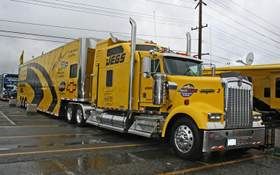When Are You No Longer A Rookie?
Topic 5604 | Page 1

Typically, drivers tend to refer to themselves as "experienced drivers" after they have 1 year of experience.

Not me, I'm still a 3 year Rookie and when I've been trucking for 10 years I'll be a 10 Year Rookie. Haha!

If you think of yourself as a experienced driver your less likely to be open to learning new things. that goes for any job in my opinion

Not me, I'm still a 3 year Rookie and when I've been trucking for 10 years I'll be a 10 Year Rookie. Haha!
I agree with you 110%. That is why I worded my response the way I did.

It is typically a year. That is when, giving a clean safety record and dac , a lot of companies will want to scoop you up. Like the others have said though, you have to be willing to learn every day. "experienced driver" is a label and nothing else.
DAC:
Drive-A-Check Report
A truck drivers DAC report will contain detailed information about their job history of the last 10 years as a CDL driver (as required by the DOT).
It may also contain your criminal history, drug test results, DOT infractions and accident history. The program is strictly voluntary from a company standpoint, but most of the medium-to-large carriers will participate.
Most trucking companies use DAC reports as part of their hiring and background check process. It is extremely important that drivers verify that the information contained in it is correct, and have it fixed if it's not.

An experienced driver is one that is retiring tomorrow.

I am a 16 year rookie and I have been in school for 16 years. Confused yet? Get used to it cause you will stay that way in trucking. For over 16 years now I have driven one type of truck or another. Hauled different freight types and been on more than a few roads but I still learn something new each day.
Did ya know that if you kick a fully inflated steer tire you might as well kicked a brick wall? It's true. I have a sore big toe to prove it
I asked my trainer this exact question... his response? "After you have driven all four seasons."
Good answers.
The trucking industry in general considers one year of safe OTR driving to be sort of like earning your badge. If you can manage that then you have what it takes to be a safe, productive driver. You've experienced all four seasons and pretty much every challenge a driver can expect to face and came out of it unscathed. That is an impressive feat by any standards. I can not imagine a single human being who would look back upon a year of safe OTR driving and think, "That wasn't that difficult to achieve." Seriously, nobody would say that.
But at the same time the job, industry, and lifestyle are so dynamic and complex that you will indeed learn something new every day.
A driver will learn extremely fast right from the start and that first 6 months out there is one hard lesson after another. It's exciting, but it will test you to the core! The next 6 months are considerably better. After one year you're feeling a lot more confident and comfortable. Somewhere around years 3 to 5 is when you really hit your stride and reach that upper tier of driving. By that point you've really experienced a staggering amount of challenges and you're not only good at handling the rig but you have street savvy. You know how to get appointment times moved. You know how to talk your way out of tickets. You've learned how to establish relationships with the right people at your company. You know how the DOT works in different states. You've learned how to find parking when there doesn't seem to be any, how to maximize the hours available in your logbook , and a ton of tricks that help you get the job done that drivers of lesser experience wouldn't have been able to figure it out. Even after five years out there you will keep learning but it's at a much slower pace and the lessons tend to be easier lessons, not the hard ones you faced repeatedly those first 6 months.
Logbook:
A written or electronic record of a driver's duty status which must be maintained at all times. The driver records the amount of time spent driving, on-duty not driving, in the sleeper berth, or off duty. The enforcement of the Hours Of Service Rules (HOS) are based upon the entries put in a driver's logbook.
OTR:
Over The Road
OTR driving normally means you'll be hauling freight to various customers throughout your company's hauling region. It often entails being gone from home for two to three weeks at a time.
DOT:
Department Of Transportation
A department of the federal executive branch responsible for the national highways and for railroad and airline safety. It also manages Amtrak, the national railroad system, and the Coast Guard.
State and Federal DOT Officers are responsible for commercial vehicle enforcement. "The truck police" you could call them.
HOS:
Hours Of Service
HOS refers to the logbook hours of service regulations.New Reply:
New! Check out our help videos for a better understanding of our forum features

















Preview:








 TT On Facebook
TT On Facebook
When is rookie status graduated up to "experienced driver"?
A few years?